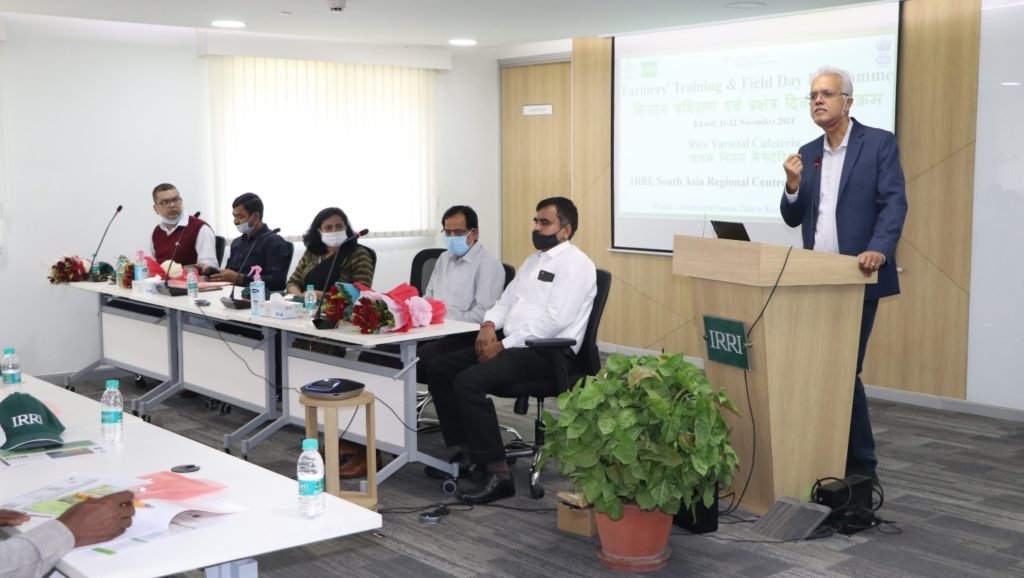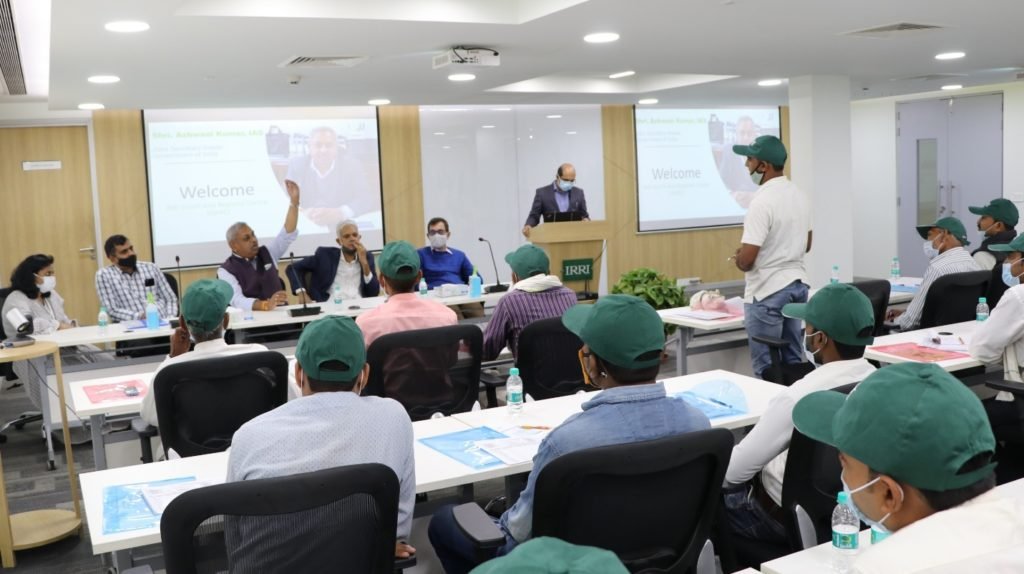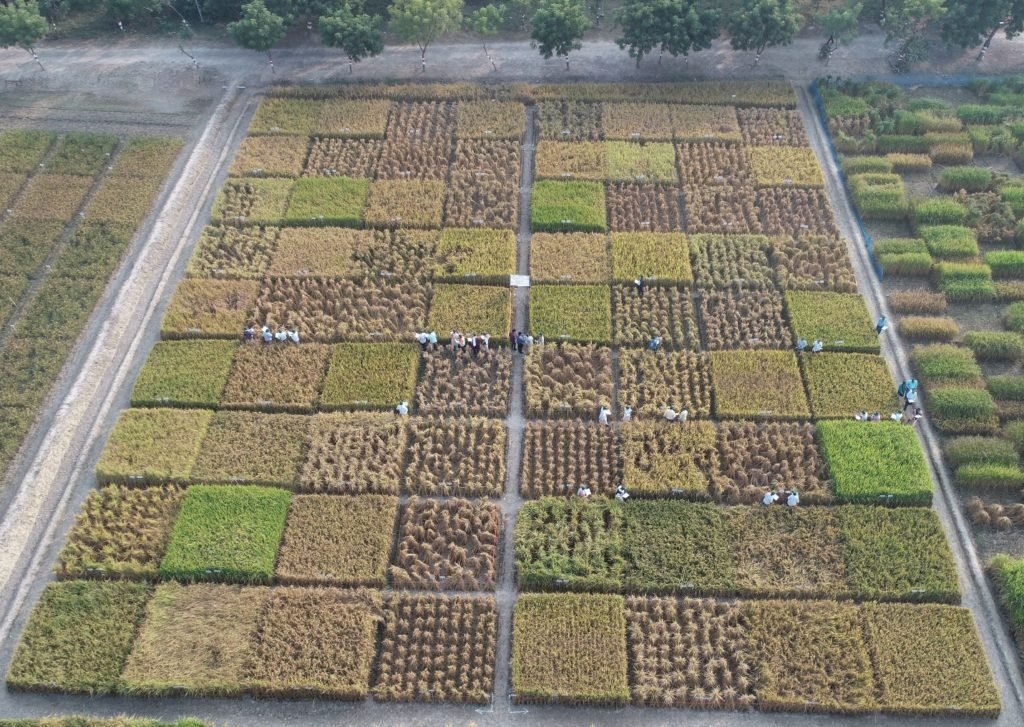Two days program on farmer orientation training and Participatory Varietal Evaluation (PVE) of Rice Varietal Cafeteria organized at International Rice Research Institute (IRRI), South Asia Regional Center (IRRI SARC). Organized on 11th and 12th November, the program was supported by Bill & Melinda Gates Foundation under the IRRI led AGGRi project, and engaged several agricultural experts/administrators who enlightened the farmers on rice seed system, value chain, varietal development and assessment methods, new varietal information and best cultural practice for quality seed production. Progressive farmers and seed chain actors (eg. dealers, seed producers) from Varanasi and Chandauli districts attended the event as participants. Krishi Vigyan Kendra Varanasi, Kaushambi from Uttar Pradesh, and Banka, Jehanabad from Bihar were virtually connected along with farmers of that area. In 2 days, a total of 60 farmers were connected online and 75 farmers in person at IRRI, SARC.
The rice varietal cafeteria provides a space where farmers and other stakeholders interact, discuss, give feedback, learn, and decide on their varietal preferences and choices through participatory engagement and evaluation procedure. The Rice Variety Cafeteria laid at ISARC showcased new, improved rice varieties of high potential challenged beside old, locally grown varieties. The pool of rice varieties grown in cafeterias included high-yielding, climate-resilient, nutrient-rich, traditional aromatic rice varieties which is being collected from 11 research institute and Agricultural Universities across India working on rice.

The program was inaugurated by Dr. Sudhanshu Singh, Director, IRRI, SARC in the presence of Dr. Swati Nayak, Scientist, Lead Seed Systems South Asia, Dr. P.K. Singh, Professor, Banaras Hindu University (Plant Breeding), Dr. M.P. Yadav, Director, NSRTC; Dr. A.K. Singh, Deputy Director, Department of Agriculture; Shri Ashwini Kumar, District Agriculture Officer, Varanasi. In the beginning, all the eminent guests addressed and encouraged the participants with their noble and enriched experiences on rice status in India. Dr. Kuntal Das, Senior Specialist, Seed Systems India, planned and conducted the program at IRRI, SARC. Shri Ashwani Kumar (IAS) Joint Secretary (Seeds) Government of India with his gracious presence addressed and encouraged the farmers followed by the visit to Crop Cafeteria on 12th November. Dr. P.K. Singh, Professor, BHU with his vast experience provided detailed training to farmers on quality seed production on both days. Participants were given relevant IRRI published knowledge brochures, booklets, flyers, pictorial guides on rice cultivation, crop protection, and seed production.

Both the days, participants evaluated 36 rice varieties planted in 2 replications, which include primarily flood-tolerant (Swarna Sub 1, Ranjit Sub 1, Samba Mahsuri Sub 1, Bina 11), drought-tolerant (Sahbhagi Dhan, Bina Dhan 17, Sabour Ardhajal, Swarna Shreya, Swarna Shakti Dhan), Deepwater adaptation (CR 508), Biotic stress-tolerant (RP Bio 226) nutrient-rich/Bio-fortified (CGZR 2, Zinko Rice, DRR 49) and high yielding varieties (Sabour Sampanna, Rajendra Mahsuri, MTU 1224, BRRI 69, Swarna Samridhi, HUR 1309, SHIAT Dhan 4) along with local popular varieties (Sarju 52, Chintu, BPT 5204, Moti) etc.

During the field visit, the participatory selection process was followed where participants were divided into small groups of 15 members each and were led by experts to successfully evaluate the basic performance-dependent features of diverse rice varieties. Through visual observations and physical examinations, stakeholders assessed various features of plants and give ratings on 1-5 scale. All the scoring data will be consolidated to arrive at the overall preference ranking of each variety evaluated. This analysis will act as a decision support tool for the seed system team to position, advance, and scale new improved rice varieties in the seed chain. The analysis will be further strengthened through data to be gathered through crop cuts which will provide rationalized decisions on the fitment of a variety to specific geography. The farmers are happy and satisfied with this two-day training program and will be committed to applying this learning from IRRI in the coming days.



